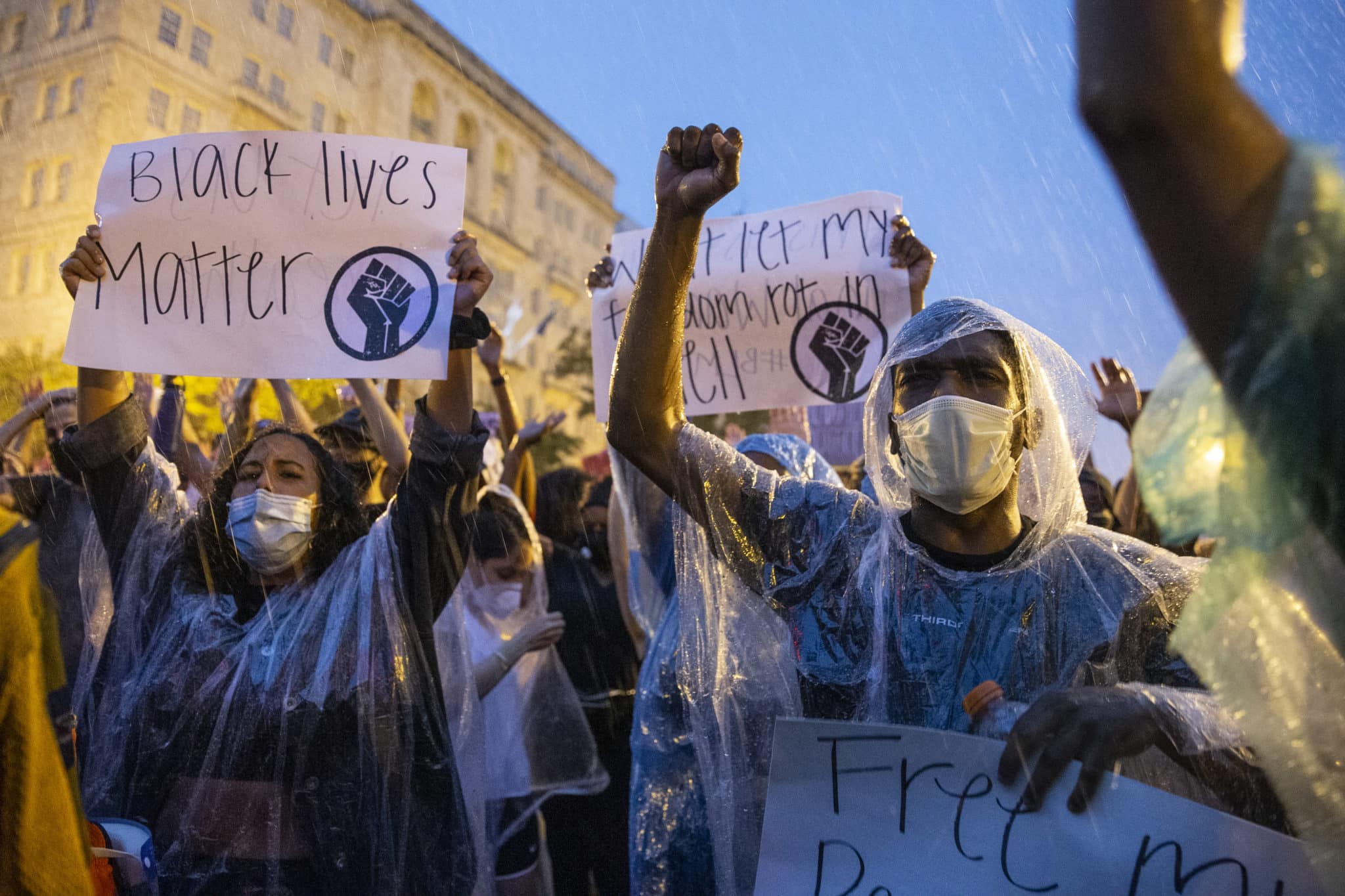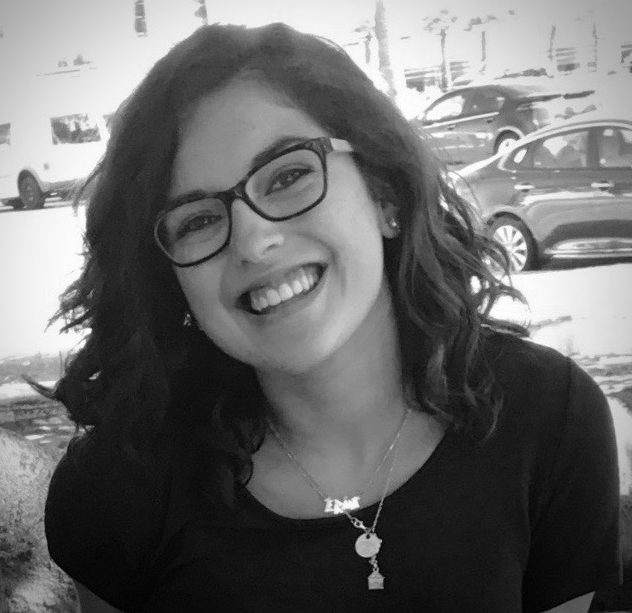 WASHINGTON, DC – JUNE 04: People gather in the rain outside of the White House for a peaceful protest against police brutality on June 4, 2020 in Washington, DC. Protests in cities throughout the country have been largely peaceful following the death of George Floyd, a black man, who died while in police custody in Minneapolis on May 25. (Photo by Sarah Silbiger/Getty Images)
WASHINGTON, DC – JUNE 04: People gather in the rain outside of the White House for a peaceful protest against police brutality on June 4, 2020 in Washington, DC. Protests in cities throughout the country have been largely peaceful following the death of George Floyd, a black man, who died while in police custody in Minneapolis on May 25. (Photo by Sarah Silbiger/Getty Images) Jewish black activist and filmmaker Rebecca Pierce marched in a protest last weekend in Boston and told the Journal that more than anything, she feared what the police would do. She said she has tried to educate others, including her white friends and colleagues about police brutality and the hardships the black community faces every day, but she can only do so much.
“It’s also exhausting,” she said. “For example, I’ve been out protesting all day and get a message from people trying to be supportive but ask[ing] me to explain something to them… It does get very tiring as a Jew of color to have to explain all of this while I’m also in pain and mourning for the way that black people are targeted and killed in this country. As of right now, I don’t see a way out of this because no one can have this conversation for us.”
While protests take place around the world in response to the death of George Floyd, Breonna Taylor, Ahmad Aubrey and the hundreds of other black people that have died as a result of police brutality, many white and white-passing community members are trying to stand with the black community. But how does one be an ally?
Pierce said one way is to recognize how police officers have been inciting violence rather than keeping the peace during the recent protests. “People were tear gassed. We know rubber bullets are used,” she said. “[If] we want to talk about looting and violence in the protests, we have to talk about the fact that police are instigating violence and they’re the ones with the power. They’re the ones with the guns.”
Actress and writer Rachel McKay Steele told the Journal that rather than relying on members of the black community for resources on how to be an ally, white and white-passing people like herself should acknowledge their privilege and put in the work and research to educate others.
“It shouldn’t be on black people to teach white people about Black Lives Matter,” Steele, 35, who lives in Angelino Heights, said. “Recommend a book you read if it taught you something about privilege; recommend an article that helped you understand systemic racism. We are a country economically built on the backs of slaves. We have to have these difficult conversations.”
Jasmine Elist, a 33-year-old Iranian-American actress who lives in West Hollywood said Jews like herself can show up as an ally by donating to the Minnesota Freedom Fund, Color of Change or Black Lives Matter Los Angeles, to name a few, having uncomfortable conversations with family and friends and by simply listening to stories by people of color.
“To me, positive allyship looks like listening and learning — knowing when to be quiet and listening to how you can be helpful or useful,” Elist said. “Recognizing your privilege and acknowledging that unless you are a Black American in America you can never truly understand what it feels like to be a Black American in America. Harmful allyship looks like making assumptive statements about how anyone ‘should be’ protesting or ‘should be’ processing an experience.” For more information, Elist suggests this link of resources.
“It may feel risky for you to create a strategy around diversity, equity and inclusion, or a strategy for engaging Jews of color. It may feel or seem avant-garde but really, what if we actually treat it like everything else? This is the Jewish community. This is what Jews do. We build our community; we bring people in.” — Gamal Palmer
Aaron White, a 30-year-old research and data analyst who lives in Little Ethiopia in L.A., thinks allyship is part of tikkun olam and said, “I think it’s important that folks support communities of color and businesses of colors. Even if it’s just a minimal presentation, putting up a poster or a sticker letting them know they are seen and can feel safe is important. If people want to take it a step further, [ask] what it is the community needs. A lot of the time we over-gesture on social media but it doesn’t always translate the same way in real life. Letting somebody actually know you’re there to help them rather than to judge is really important and powerful.”
Raised by social justice activists, Jewish Federation of Los Angeles (JFLA) Senior Vice President Gamal J. Palmer said he’s finding himself playing an educational role in fighting racism behind the scenes. He oversees leadership programs and development at JFLA but as a black Jew he also works to grow Jewish spaces so Jews of color feel safe and welcome in their community.
“I’m more useful supporting people, engaging with my networks — that’s where my activism is expressed,” Palmer said. “There is an unknowing. I think that when we don’t know something or we are not familiar with it in the way we are familiar with other things, it creates an anxiety…It may feel risky for you to create a strategy around diversity, equity and inclusion, or a strategy for engaging Jews of color. It may feel or seem avant-garde but really, what if we actually treat it like everything else? This is the Jewish community. This is what Jews do. We build our community; we bring people in.”
Citing 76-year-old black, political activist Angela Davis, Pierce added, “We need to remember, like Angela Davis says, ‘Freedom is a constant struggle.’ There’s no end point to making the world a better place. We can move beyond this point but it takes commitment, it really takes solidarity, it takes a willingness to sacrifice our own comfort for a future in which we can all be freer together.”























 More news and opinions than at a Shabbat dinner, right in your inbox.
More news and opinions than at a Shabbat dinner, right in your inbox.